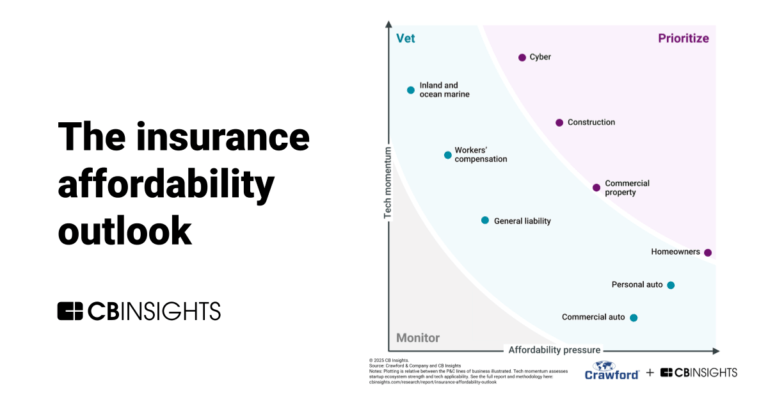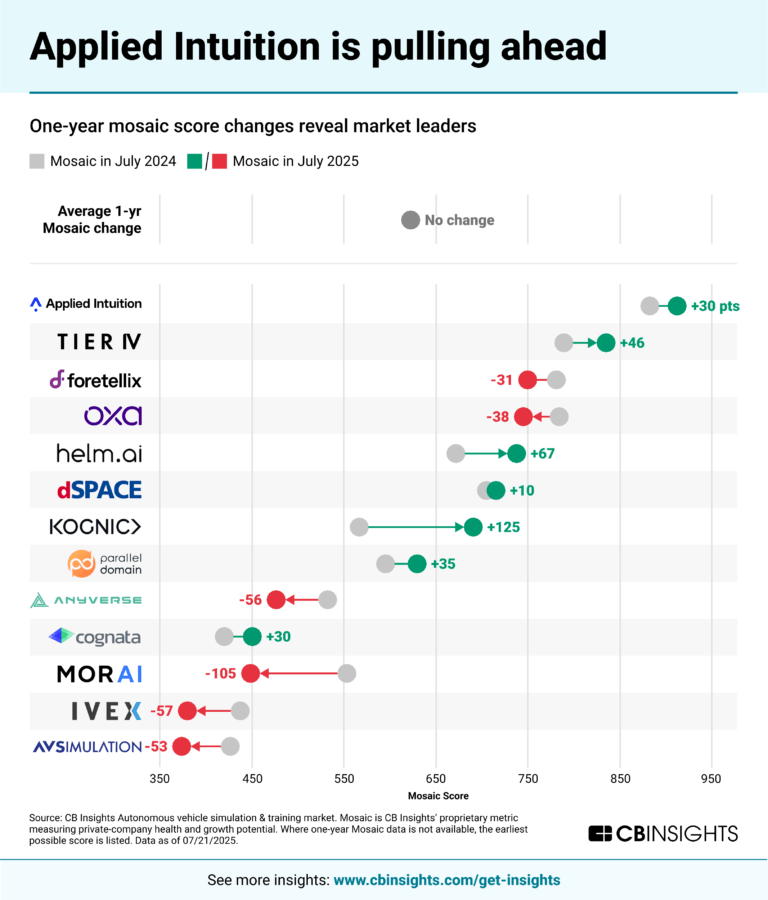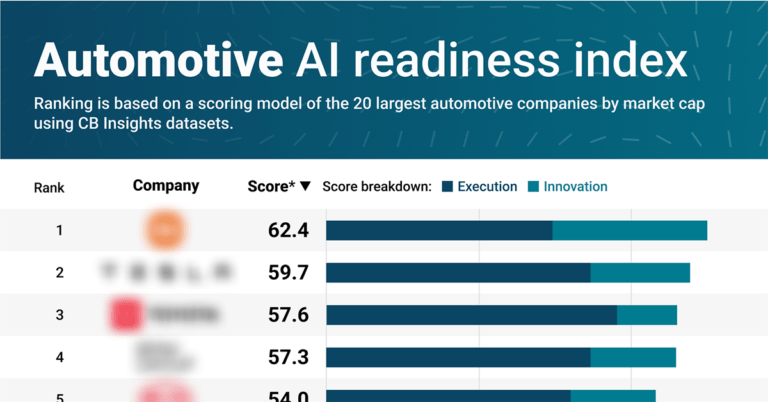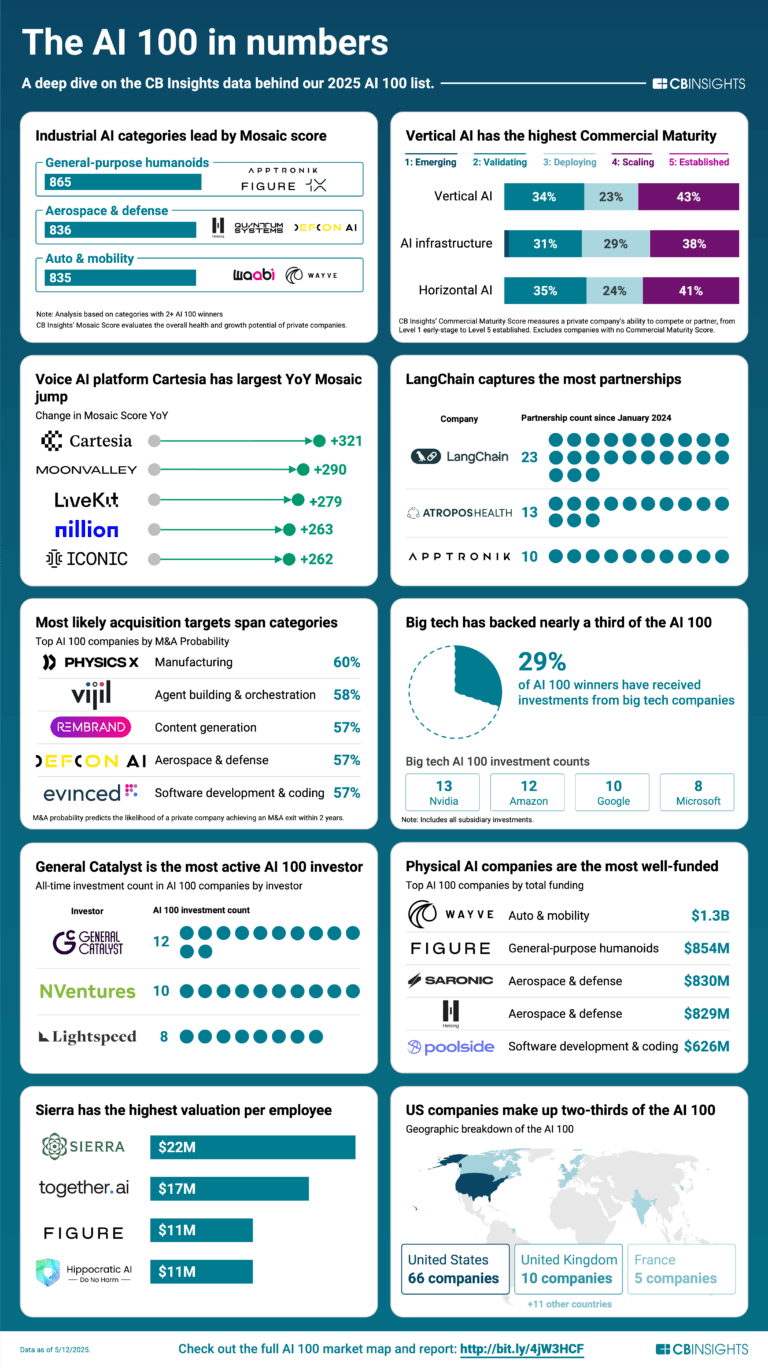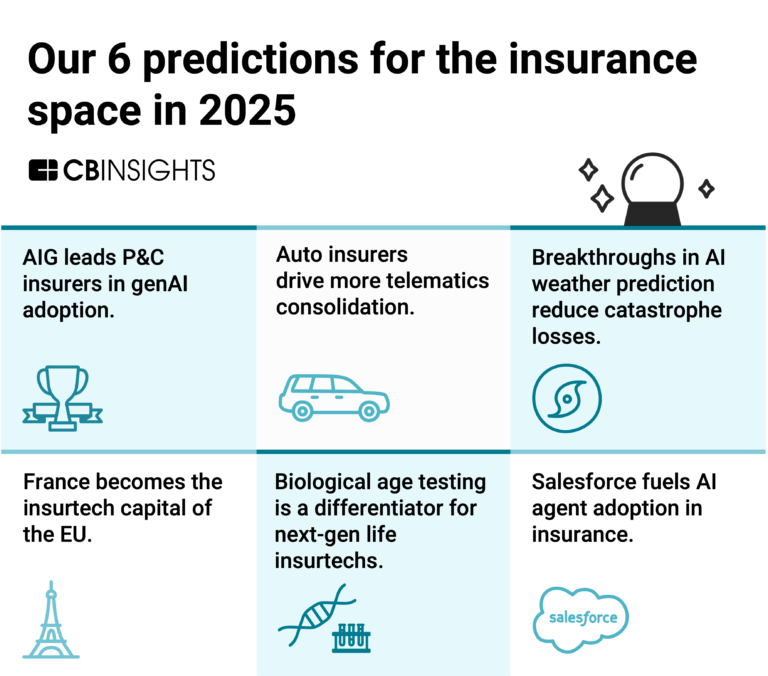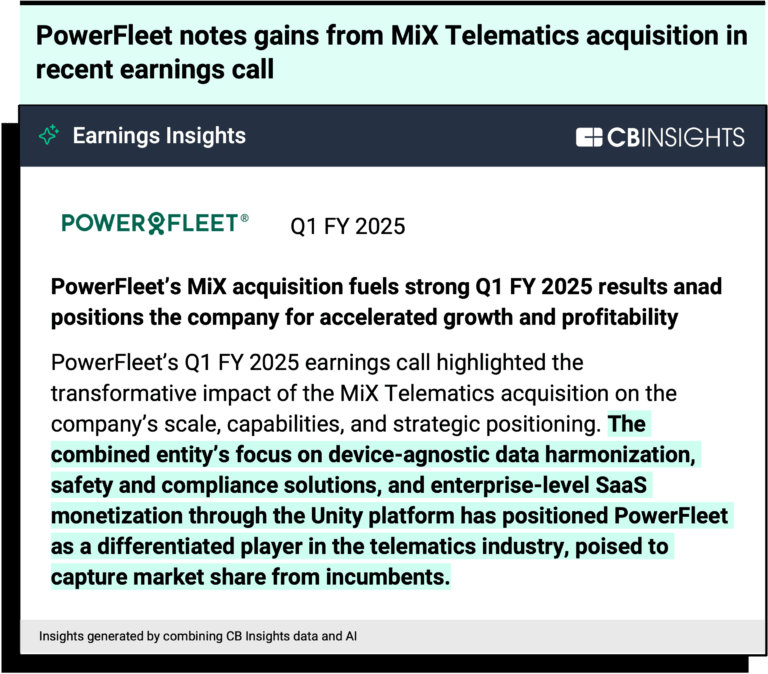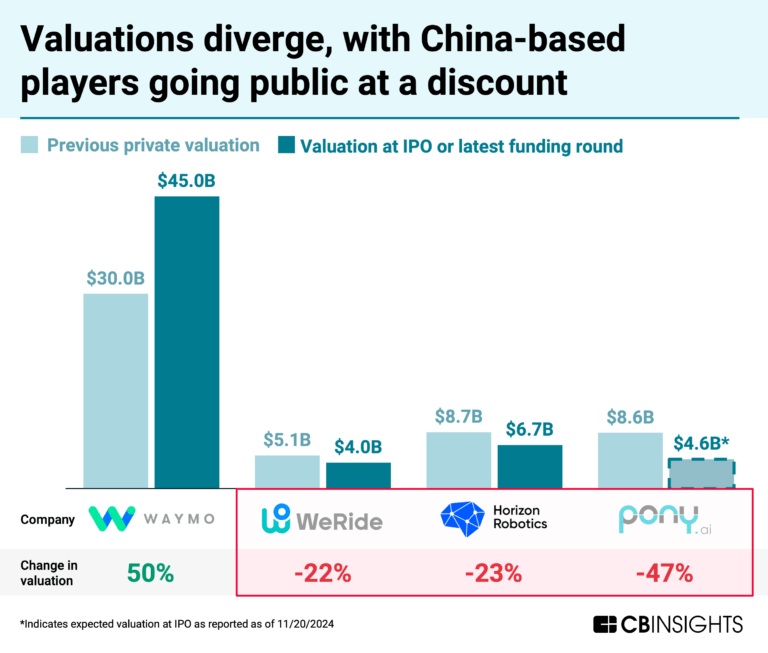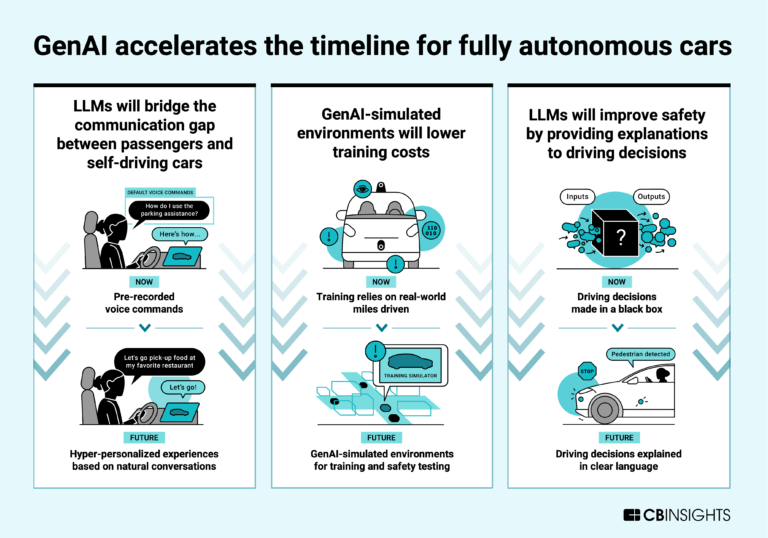
Waymo
Founded Year
2009Stage
Grant | AliveTotal Raised
$11.3BValuation
$0000Revenue
$0000About Waymo
Waymo operates within the transportation and mobility sector and offers a ride-hailing service called Waymo One, which uses its technology, the Waymo Driver. Waymo's vehicles are fully electric and utilize renewable energy. It was founded in 2009 and is based in Mountain View, California.
Loading...
ESPs containing Waymo
The ESP matrix leverages data and analyst insight to identify and rank leading companies in a given technology landscape.
The autonomous driving systems market focuses on developing technologies that enable vehicles to achieve various automation levels, from partial (Level 2) to full autonomy (Level 5), moving beyond the driver support of ADAS to complete self-driving capabilities. It includes advances in sensors, AI, mapping, and connectivity to achieve higher levels of automation. Driven by potential safety improve…
Waymo named as Leader among 15 other companies, including Horizon Robotics, Aurora, and WeRide.
Loading...
Research containing Waymo
Get data-driven expert analysis from the CB Insights Intelligence Unit.
CB Insights Intelligence Analysts have mentioned Waymo in 10 CB Insights research briefs, most recently on Oct 14, 2025.
Expert Collections containing Waymo
Expert Collections are analyst-curated lists that highlight the companies you need to know in the most important technology spaces.
Waymo is included in 4 Expert Collections, including Auto Tech.
Auto Tech
2,663 items
Companies working on automotive technology, which includes vehicle connectivity, autonomous driving technology, and electric vehicle technology. This includes EV manufacturers, autonomous driving developers, and companies supporting the rise of the software-defined vehicles.
Supply Chain & Logistics Tech
5,082 items
Companies offering technology-driven solutions that serve the supply chain & logistics space (e.g. shipping, inventory mgmt, last mile, trucking).
Smart Cities
2,188 items
Artificial Intelligence (AI)
20,894 items
Waymo Patents
Waymo has filed 2260 patents.
The 3 most popular patent topics include:
- autonomous cars
- automotive technologies
- advanced driver assistance systems

Application Date | Grant Date | Title | Related Topics | Status |
|---|---|---|---|---|
2/26/2021 | 4/8/2025 | Lidar, Autonomous cars, Cartography, NASA space probes, Surveying | Grant |
Application Date | 2/26/2021 |
|---|---|
Grant Date | 4/8/2025 |
Title | |
Related Topics | Lidar, Autonomous cars, Cartography, NASA space probes, Surveying |
Status | Grant |
Latest Waymo News
Nov 16, 2025
Robotaxi Revolution Hits a Snag: Waymo’s Fatal Encounter with San Francisco’s Beloved Cat Waymo's autonomous vehicles have transformed San Francisco's streets, but the fatal striking of beloved cat KitKat has sparked outrage, calls for regulation, and even a meme coin. This incident highlights tensions between tech innovation and community safety, as Waymo expands amid growing scrutiny. Robotaxi Revolution Hits a Snag: Waymo’s Fatal Encounter with San Francisco’s Beloved Cat Written by Maya Perez Saturday, November 15, 2025 SAN FRANCISCO—In the bustling streets of San Francisco’s Mission District, autonomous vehicles from Alphabet Inc.’s Waymo have become a familiar sight, ferrying passengers without human drivers and symbolizing the cutting edge of transportation technology. But a tragic incident last month has thrust the company into an unexpected controversy, highlighting the tensions between innovation and community sentiment in one of America’s most tech-savvy cities. On October 29, 2025, a Waymo robotaxi struck and killed KitKat, a brown tabby cat affectionately known as the ‘Mayor of 16th Street’ by local residents. The feline, a fixture at a neighborhood bodega, wandered into the path of the self-driving Jaguar I-Pace, according to footage reviewed by authorities. This event, while seemingly minor in the grand scheme of urban accidents, has ignited a firestorm of debate over the safety and regulation of autonomous vehicles. The Incident That Shook the Mission District Details of the accident emerged quickly, with witnesses describing the Waymo vehicle stopping abruptly after the impact but unable to prevent the tragedy. The San Francisco Chronicle reported that KitKat’s death prompted immediate outcry, with Supervisor Jackie Fielder introducing a resolution calling for state legislators to empower local voters on autonomous vehicle (AV) deployments. ‘This isn’t just about a cat; it’s about accountability in our streets,’ Fielder stated in a press conference, as quoted by the San Francisco Chronicle . The Guardian detailed how KitKat, often seen lounging outside the bodega on 16th Street, had become a community icon, drawing affection from passersby and even inspiring local art. The publication noted that the cat’s death ‘reignited fury over robotaxis,’ with residents organizing vigils and protests against Waymo’s expanding presence. Social media amplified the story, turning KitKat into a symbol of anti-tech backlash in a city long divided on innovation’s costs. Waymo’s Response and Broader Implications Waymo, a subsidiary of Google parent Alphabet, issued a statement expressing regret over the incident. ‘We are deeply saddened by this event and are reviewing our systems to prevent future occurrences,’ a spokesperson told The New York Times. The company emphasized that its vehicles are equipped with advanced sensors designed to detect obstacles, but small animals like cats pose unique challenges in urban environments. According to The New York Times , Waymo’s fleet has logged millions of miles in San Francisco since launching public rides in 2024, with this being one of the few fatal animal incidents. Industry experts point to the limitations of current AV technology. Mission Local reported that transportation safety advocates are demanding Waymo release full sensor data from the incident, arguing for greater transparency. ‘AV companies must come clean on how their algorithms handle unpredictable scenarios,’ said Phil Koopman, a Carnegie Mellon University professor specializing in autonomous systems, as cited in Mission Local . This call echoes broader concerns about black-box AI decision-making in self-driving cars. Regulatory Pushback and Political Ramifications The fallout has spurred political action. The Washington Post highlighted how San Francisco leaders, including Fielder, are pushing for legislation to impose stricter checks on Waymo operations. ‘The death of KitKat raises questions about the role of self-driving cars in our neighborhoods,’ the Washington Post reported, noting proposals for voter referendums on AV expansions. This comes amid Waymo’s aggressive growth, including recent approvals for freeway rides and airport testing at San Francisco International. Rolling Stone captured the cultural angle, describing KitKat as the ‘Mayor of 16th Street’ whose demise has fueled calls for AI car reform. The magazine quoted local activists: ‘These robotaxis are invading our streets without enough oversight,’ said one protester in a piece from Rolling Stone . The incident has divided opinions, with some defending Waymo’s safety record compared to human drivers. Tech Industry Reactions and Expansions Elon Musk, CEO of Tesla, weighed in on the controversy via X, stating, ‘Many pets will be saved by autonomy,’ as reported by Newsweek. This comment underscores the competitive landscape, where Tesla’s Full Self-Driving ambitions rival Waymo’s robotaxi model. Meanwhile, recent posts on X from users like Sawyer Merritt announced Waymo’s public launch in San Francisco without invite codes, signaling rapid scaling despite the backlash. Waymo’s expansions continue apace. According to posts on X from The Information, the company is set to begin phase two testing at San Francisco International Airport, allowing autonomous pickups. Tim Hughes shared on X that Waymo now offers fully autonomous freeway rides across the Bay Area, Phoenix, and Los Angeles, expanding to San Jose. These developments, credited to sources like TechCrunch and CNBC, illustrate Waymo’s momentum even as public sentiment sours. From Tragedy to Meme: Cultural and Economic Ripples In a quintessentially San Francisco twist, KitKat’s story has transcended tragedy to enter the crypto world. The SF Standard reported the launch of a meme coin inspired by the cat, valued at over $3.5 million shortly after its debut. ‘In what may be the most San Francisco story ever told,’ the SF Standard noted, highlighting how grief morphed into digital speculation. YouTube videos, such as one titled ‘Driverless Waymo Car Kills Adored Neighborhood Cat, Kitkat,’ have garnered significant views, amplifying public outrage. Posts on X from accounts like No Safe Words described incidents where Waymo vehicles blocked intersections during events like Pride, pointing to operational glitches in special scenarios. These anecdotes fuel debates on AV reliability in dynamic urban settings. Safety Data and Future Challenges Waymo touts its safety record, with data showing fewer accidents per mile than human-driven vehicles. However, critics argue that incidents like KitKat’s expose gaps in handling non-human obstacles. The New York Times analysis revealed that while Waymo vehicles are ubiquitous in San Francisco, public uproar following the cat’s death has led to renewed scrutiny from regulators. Looking ahead, experts like those quoted in The Guardian warn that without adaptive regulations, such tragedies could erode trust in AV technology. ‘KitKat was struck and killed by a Waymo in the city’s Mission District,’ The Guardian reported, emphasizing the need for community input. As Waymo pushes boundaries with airport and freeway services, balancing innovation with safety remains paramount. Economic Stakes in Autonomous Mobility The stakes are high for Alphabet, with Waymo valued as a key growth driver. Recent X posts from StockMKTNewz noted approvals for San Jose expansions, positioning Waymo ahead of competitors like Cruise, which faced its own setbacks. Yet, the KitKat incident underscores reputational risks in consumer-facing tech. Industry insiders view this as a pivotal moment. As one analyst told the Washington Post, ‘The death of a beloved cat has done what traffic jams couldn’t—galvanize opposition.’ With San Francisco as a testing ground, the resolution of this controversy could shape the national trajectory of autonomous vehicles. Subscribe for Updates
Waymo Frequently Asked Questions (FAQ)
When was Waymo founded?
Waymo was founded in 2009.
Where is Waymo's headquarters?
Waymo's headquarters is located at 1600 Amphitheatre Parkway, Mountain View.
What is Waymo's latest funding round?
Waymo's latest funding round is Grant.
How much did Waymo raise?
Waymo raised a total of $11.3B.
Who are the investors of Waymo?
Investors of Waymo include Vinnova, Perry Creek Capital, Fidelity Investments, T. Rowe Price, Alphabet and 11 more.
Who are Waymo's competitors?
Competitors of Waymo include Vay, May Mobility, Gatik, PlusAI, Imagry and 7 more.
Loading...
Compare Waymo to Competitors

Embark Trucks focuses on developing software to facilitate the integration of autonomous trucks into carrier fleets. Its main offering is software designed for the autonomous operation of trucks. The company's technology serves the logistics and transportation sectors. Embark Trucks was formerly known as Varden Labs. It was founded in 2016 and is based in San Francisco, California.

ISEE operates as a technology company that focuses on autonomous driving systems, specifically in the logistics and supply chain industry. The company offers advanced autonomous yard truck solutions and operations, improves efficiency, and enhances safety in yard operations. It was founded in 2017 and is based in Cambridge, Massachusetts.

Peloton Technology is an automated vehicle technology company that focuses on safety and efficiency within the trucking industry. The company offers a truck platooning system that links the active safety systems of paired trucks to form an aerodynamic platoon, leading to fuel savings and collision mitigation through vehicle-to-vehicle communication. Peloton's services are primarily geared towards the freight trucking sector, providing a cloud-based network operations center to manage platooning operations. It was founded in 2013 and is based in Mountain View, California.

Torc Robotics is involved in the development of autonomous trucking solutions within the freight industry. The company works on self-driving trucks intended for long-haul transportation. Torc Robotics collaborates with fleet management companies to explore autonomous solutions. It was founded in 2005 and is based in Blacksburg, Virginia. TORC Robotics operates as a subsidiary of Mercedes-Benz Group.

Bot Auto is an L4 autonomous trucking company that operates within the transportation sector, offering Transportation as a Service (TaaS) to freight customers. The company provides fleet operations for autonomous trucks, utilizing AI technology to improve safety and efficiency in the freight and logistics industry. Bot Auto's services aim to address the driver shortage while integrating into the existing freight market. It was founded in 2024 and is based in Houston, Texas.
NuPort Robotics focuses on autonomous trucking technology within the transportation and logistics sectors. The company offers a retrofit system that enables existing commercial vehicles to operate autonomously, alongside a fleet management platform that provides insights and analytics to improve operational efficiency. NuPort's solutions aim to improve safety, decrease emissions, and optimize asset usage for customers in various sectors. It was founded in 2019 and is based in Toronto, Canada.
Loading...

